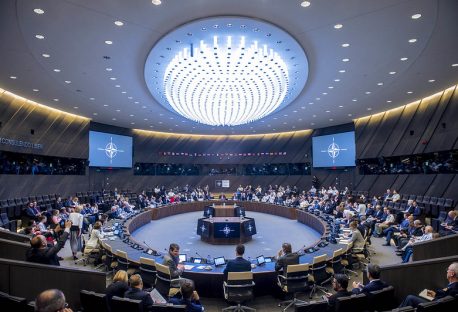
At their April 2009 summit, NATO heads of state and government tasked Anders Fogh Rasmussen, the organisation’s Secretary General, to define the Alliance’s role and mission for the 21st century in a new Strategic Concept. In response, Mr Rasmussen has produced such a concept and the alliance has approved it. However, to be a success in practice, the new Concept must allow for NATO’s founding ideas of collective defence, the transatlantic link, and burden-sharing to be retained but applied to challenges far different from those faced at the time of the Alliance’s formation. This is far from an easy task but it is a vital one, and nowhere is it more needed than in the area of NATO nuclear policy.
For months now, a debate on the future of U.S. theatre nuclear weapons stationed in Europe has been occurring around, but outside, the formal Concept review process. In October last year the German Foreign Minister, Guido Westerwelle, called for the removal of these weapons from German soil. Shortly thereafter, he was joined by four other NATO Foreign Ministers in demanding that the issue be put on the agenda for April’s meeting of alliance Foreign Ministers in Tallinn.
Stationed in Belgium, Germany, Italy, the Netherlands and Turkey as part of the US nuclear umbrella extended over Europe, these weapons had a specific military purpose. With a short, ‘tactical’, range and the majority unable to reach beyond mainland Europe, they were deployed in order to deter a physical invasion of Western Europe by the numerically superior conventional forces that the Soviet Union possessed at the time of the Cold War. Motivated by a mix of factors such as the declining military utility and relevance of the weapons, the future costs associated with replacing the ageing aircraft that would deliver them, and a belief that more must be done to promote multilateral nuclear disarmament, some governments believe the weapons should now be removed altogether. Others in the Alliance are worried that if one or two countries remove them unilaterally, not only will the principle of nuclear burden-sharing between the US and the Europeans be compromised but so too will the transatlantic link and the overall quality of collective defence commitments within NATO.
In our view, if NATO is to remain of central relevance to the security challenges we face today, the Alliance must address this issue head-on and not seek to by-pass it.
We face growing proliferation risks in relation to individual countries like Iran and North Korea, regional proliferation risks in the Middle East and Asia, a potential future threat from nuclear terrorism, and real concerns that the relative stability of the Cold War nuclear stand-off will not be replicable in 21st century conditions. In these circumstances, the fear of nuclear use at some point in future is a real one and neither unilateral disarmament nor continued commitment to the status quo represents a good enough option to deal with it. NATO members must do all they can to strengthen the global non-proliferation regime, but as a nuclear Alliance, must also take the opportunity of the newly announced review of NATO deterrence policy to show responsible leadership on the disarmament side of the equation.
As a consequence, we are calling for significant changes to NATO nuclear policy. We welcome the opportunity to review NATO nuclear policy, post-Lisbon.
In particular, given that the NATO theatre nuclear weapons have lost their original role of deterring massive Soviet conventional force superiority, we are calling for an Alliance commitment to further reduction and consolidation of the 200 U.S. tactical nuclear weapons stationed in Europe, and for fresh efforts at engagement with Russia leading to a mutual and verifiable agreement on the reduction, and eventual elimination, of tactical nuclear weapons across Europe as a whole. Part of this approach would seek comparable removal of Russia’s tactical nuclear weapons, for example those stationed at Kaliningrad and on the Kola peninsula.
To facilitate this engagement, we are also calling for an updated Conventional Forces in Europe (CFE) treaty and for the NATO-Russia Council to support cooperative dialogue with Russia on ballistic missile defence. Again, we welcome developments on this second area in Lisbon.
Whereas the 1999 NATO Strategic Concept talked of a role for nuclear weapons in ensuring uncertainty in the minds of any potential aggressor, we are further calling for the Alliance to declare that the fundamental purpose of NATO’s nuclear weapons today is to deter nuclear attack. As the US realised in its Nuclear Posture Review process earlier this year, the Alliance can hardly expect others to forego nuclear weapons in future if it continues to assign a value to them in meeting an unspecified range of non-nuclear threats.
In its post-Lisbon nuclear review, the Alliance must work to avoid unilateral national decisions on nuclear policy and posture and find new ways to marry concepts like deterrence, collective defence, burden-sharing and the transatlantic link with the responsibility to do more to address the world’s growing nuclear dangers. This means asking challenging questions: Are NATO’s current nuclear arrangements the only way to reassure all members of the Alliance that the burden of nuclear risks and responsibilities is adequately shared? Are there alternative burden-sharing arrangements that could offer more freedom of manoeuvre on disarmament while at the same time maintaining both Alliance political cohesion and providing reassurance to those that need to be re-assured?
To ask these questions as part of a formal and inclusive Alliance process is not, as some have claimed, to seek to thoughtlessly unpick the delicate bargain on such issues within NATO and thereby put it at risk. It is, on the contrary, to grapple with the central task facing the Alliance today, namely how to apply the ideas that have served us well in the past to the challenges of today and of a new century. Anything less would increase the chance of unilateral and unmanaged changes that would be far more damaging. In the post-Lisbon phase, NATO must rise to the challenge and act collectively to move alliance nuclear policy into a new era.
The opinions articulated above represent the views of the author(s), and do not necessarily reflect the position of the European Leadership Network or any of its members. The ELN’s aim is to encourage debates that will help develop Europe’s capacity to address the pressing foreign, defence, and security challenges of our time.





